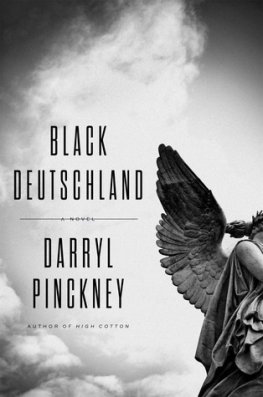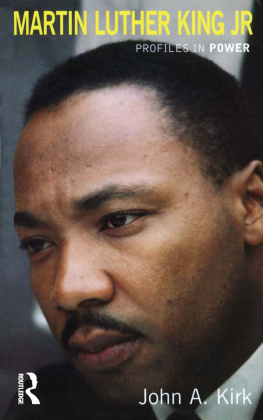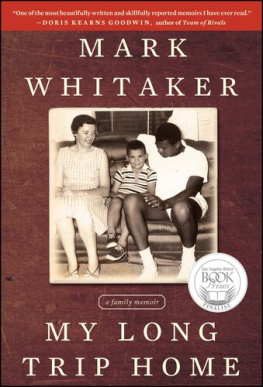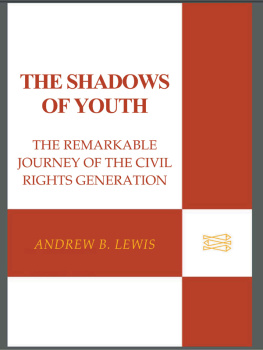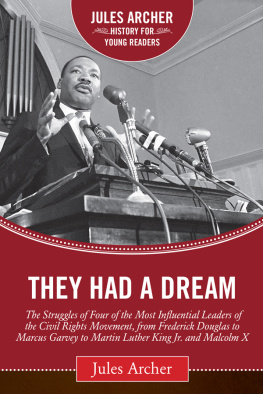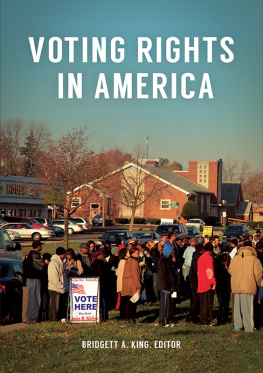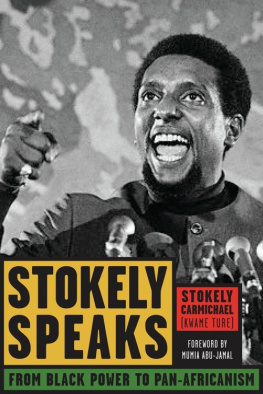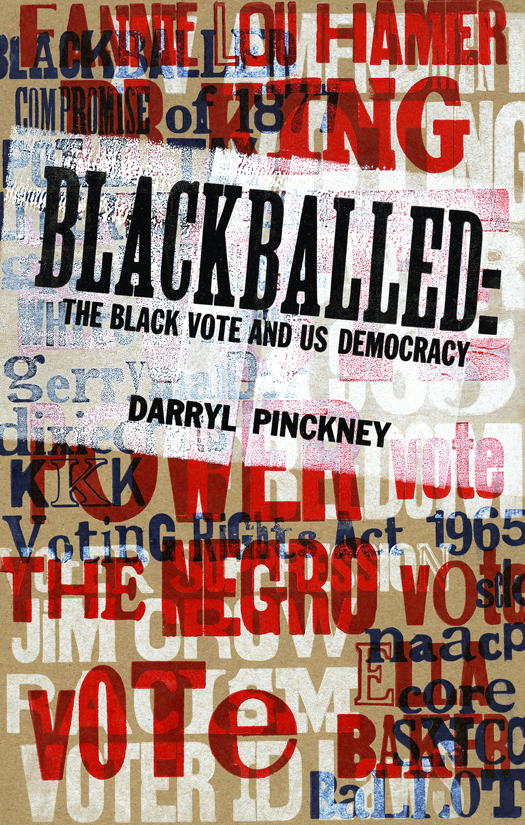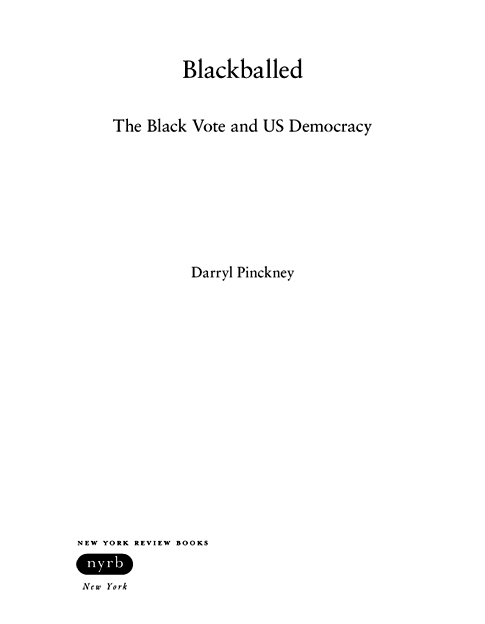THIS IS A NEW YORK REVIEW BOOK
PUBLISHED BY THE NEW YORK REVIEW OF BOOKS
Copyright 2014 by Darryl Pinckney
Copyright 2014 by NYREV, Inc.
All rights reserved, which includes the right to reproduce this book or portions thereof in any form whatsoever.
Published by The New York Review of Books, 435 Hudson Street, Suite 300, New York NY 10014
www.nyrb.com
The Library of Congress has catalogued the hardcover edition of this book as follows:
Pinckney, Darryl, 1953
Blackballed : the Black vote and US democracy / by Darryl Pinckney.
pages cm
ISBN 978-1-59017-769-3 (hardback : alkaline paper)
1. African AmericansSuffrageHistory. 2. VotingUnited StatesHistory. 3. Political participationUnited StatesHistory. 4. ElectionsUnited StatesHistory. 5. African AmericansPolitics and government. 6. African AmericansCivil rightsHistory. 7. Pinckney, Darryl, 1953Childhood and youth. 8. DemocracyUnited StatesHistory. 9. United StatesPolitics and government. 10. United StatesRace relationsPolitical aspects. I. Title.
JK1924.P65 2014
324.6208996073dc23
2014019161
eISBN 978-1-59017-813-3
v3.1
For my brother-in-law,
Wayne Withers
Contents
Acknowledgments
I THANK ROBERT SILVERS for the chance to give in 2012 the lecture named for him at the New York Public Librarythe title essay of this book is based on that lectureand for opening the pages of The New York Review of Books to me all those many years ago. I want also to thank Michael Shae for his patience with me and his careful reading of this work.
BLACKBALLED:
THE BLACK VOTE AND US DEMOCRACY
I WAS WRONG , I remember my father saying in 2004. Kerrys exit polls had shown him ahead in Florida and Ohio, but by ten thirty everyone I knew had gone home. Bush won, which meant that the Republicans controlled the White House, both houses of Congress, the Supreme Court, and television news. Its their world, my mother said. She said that the morning after the election instead of the news she had coffee in front of reruns of Little House on the Prairie, because at least in that world the bad were punished.
My father often lectured me on black history. He once told me that had he not left Georgia he would have ended up dead. Truman was the last Democratic candidate to win the presidency without the South. My father forgot that Truman took Georgia. Then, too, Truman in 1948, like Johnson in 1964, won Texas, Florida, and the Upper South. But my father did not like to be interrupted. The Dixiecrats went to the Republican Party and said that they would be the party to contain the blacks, as he put it. Since 1968, the Republicans had gone into every election with the advantage of not needing to campaign in the South, of knowing that they had 136 electoral votes or thereabouts straight off the bat. There were few voting stations in districts where blacks lived, meaning the lines to vote were long, it could take hours, and often people were given hell for missing work. In other words, they didnt have to steal the election, because it was nearly fixed to begin with. Kerry did well, considering how rigged democracy is in the US, my father said.
I had a folder of printed-out articles about the previous election, how there had been more votes cast in Cuyahoga County, Ohio, than there were voters registered, for instance. But on that visit home to Indianapolis, I noticed that the plastic on the DVD of Fahrenheit 911, Michael Moores 2004 documentary about the Bush administrations corruption that Id given my parents, had not been unwrapped. Id especially wanted them to see the opening scene of the joint congressional session that certified the 2000 election results. For members of the House to object officially, they had to have the signed support of at least one senator. In the scene, Black Caucus member after Black Caucus member comes forward to lament that the Senate is missing. Even Ted Kennedy remained seated.
I am glad that my father and mother lived long enough to fill out their absentee ballots and to see Barack Obama win. The 106-year-old black voter whom the president-elect made special mention of as someone who had to wait in line a long time before she could cast her ballot was my grandparents next-door neighbor in Atlanta, and her daughter and my mother were college roommates. She was also the grandmother of noted Harvard sociologist Lawrence Bobo, I said. My mother became her old self long enough to fix me that look. Youre such a snob, she said. My parents watched the Inauguration in matching wheelchairs and then they went downhill further and died, side by side, as they had done most things through the sixty-three years of their marriage.
1.
White violence against blacks had gone unpunished for the most part during Reconstruction, when black candidates, black voting officials, and black voters were beaten or killed by gangs of hooded vigilantes. Crops and farms were burned; there was a strong correlation between voting and landownership among blacks during Reconstruction. Many whites just could not abide the fact of black people owning property like white people. The Compromise of 1877 by which Rutherford B. Hayes and his whiskers became president ended Reconstruction. Hayes withdrew federal troops from the former states of the Confederacy while white supremacists reclaimed their power, driving blacks from office and from the voting rolls, subjecting them to political persecution.
The first section of the Fifteenth Amendment states that the federal government cannotand that state governments also cannotdeny United States citizens the right to vote based on race, color, or previous condition of servitude. The second and final clause gives Congress the power to enforce the first provision. However, the purposely spare wording of the amendment does not define universal suffrage or establish uniform requirements for voting. After the Civil War, Republicans who supported blacks voting in the South opposed the Chinese having the vote in California. Moreover, the Fifteenth Amendment does not rule out property requirements, poll taxes, or literacy tests, means by which European immigrants and the white poor as well as free blacks had been excluded from the rolls, historically, depending on which state they lived in.
In one story about elections in the early 1880s, a white sheriff warned the Red Shirts, a white paramilitary group, that the blacks in Promised Land had a reputation for using their Winchesters and shotguns. Black men walked three miles to the polls at the post office in the next town. They went in groups, the better to protect themselves. There was one box for ballots cast by blacks, a separate box for those of whites.
Promised Land survived, perhaps because it was an overlooked, isolated Negro world. In the 1890s, the Democratic Party and state legislatures throughout the former Confederacy established all-white primaries from which black voters were banned. Black people were in effect excluded from the electoral process. They were a subdued population, politically. A black person could be killed or abducted for no reason on the way home from church and the crime never investigated.
Throughout the South as states rejoined the Union state legislatures passed laws that disfranchised black people. The federal government did not help; neither did the federal courts or even the Supreme Court, insisting that black people had a remedy in that they could file suit in their states. But because blacks were barred from juries and election boards, their cases were never heard. Southern congressional power needed unfairness: the number of representatives southern states were entitled to was determined by their total populations. However, those unlikely to support the Democrats were kept from voting. In 1904, though 782,509 black people represented 58 percent of South Carolinas population, only 25,433 blacks voted.


